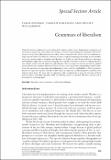Grammars of liberalism
Abstract
Liberalism has been fundamental to the making of the modern world, at times shaping basic assumptions as to the nature of the political, and in other cases existing as a delimited political project in contention with others. Across its long history, liberal projects have taken a diverse range of forms, which resist easy reduction to a single logic or history. This diversity, however, has often escaped anthropological attention. In this introduction to our special section on Grammars of Liberalism, we briefly trace this historical diversity, interrogate anthropological approaches to conceptualizing liberalism, and offer a broad framework for studying liberalism which remains attentive to both continuity and difference. Firstly, we argue for attention to how the political claims made by liberal projects unfold at the levels of values, their interrelations (morphology), and the underlying rules governing the expression and combination of values, and their intelligibility as liberal (grammar). Secondly, we argue for empirical attention to how values are expressed and liberal projects assembled across different social forms. We argue that this approach enables anthropology to grasp the diversity of liberal political projects and subject positions while still allowing scholars to approach liberalism critically and to interrogate its underlying logics.
Citation
Fedirko , T , Samanani , F & Williamson , H 2021 , ' Grammars of liberalism ' , Social Anthropology , vol. 29 , no. 2 , pp. 373-386 . https://doi.org/10.1111/1469-8676.13061
Publication
Social Anthropology
Status
Non peer reviewed
ISSN
0964-0282Type
Journal article
Description
Taras Fedirko would like to acknowledge funding from the British Academy (grant no. PF20/100094) and the European Research Council (ERC) under the European Union’s Horizon 2020 research and innovation programme (grant agreement no. 683033).Collections
Items in the St Andrews Research Repository are protected by copyright, with all rights reserved, unless otherwise indicated.

